This post may contain affiliate links. Please read my disclosure for details at the bottom of this page. As an Amazon Associate, I earn from qualifying purchases on this Korean acorn jelly salad recipe and article. We hope you enjoy learning how to make dotorimuk-muchim!
Recently, I wrote a recipe article about Korean acorn jelly, otherwise known in Korean as ‘dotorimuk’ (도토리묵). In South Korea, people make that traditional dish using acorn starch powder, water, salt, and oil. Once made, this Korean acorn jelly is used in a variety of dishes, including the recipe I am writing about here: ‘dotorimuk-muchim’ (도토리묵무침)!
Let’s learn how to make this Korean acorn jelly salad below!
What Is Dotorimuk-Muchim?
Acorn jelly salad, known as ‘dotorimuk-muchim’ (도토리묵무침), is a Korean traditional Korean side dish made by combining acorn jelly with vegetables and tossed with a soy-sauce-based dressing. As stated above, the term ‘dotorimuk’ (도토리묵) translates to acorn jelly. Then, ‘Muchim’ (무침) translates literally from Korean to English as ‘to season.’ This term describes a certain style of dish seasoned with a dressing. Muchim ingredients can be sautéed, seasoned, marinated, steamed, dried, or even raw.
Historically, people made dotorimuk dishes during the fall season after the acorns finished falling from the oak trees. Nowadays, people make it throughout the year because they can buy acorn starch powder at the grocery store.
Note: I always recommend making acorn jelly for this recipe from scratch rather than buying it pre-made from Asian grocery stores. The flavor of the jelly tastes much better and does not contain any filler ingredients (such as corn starch).
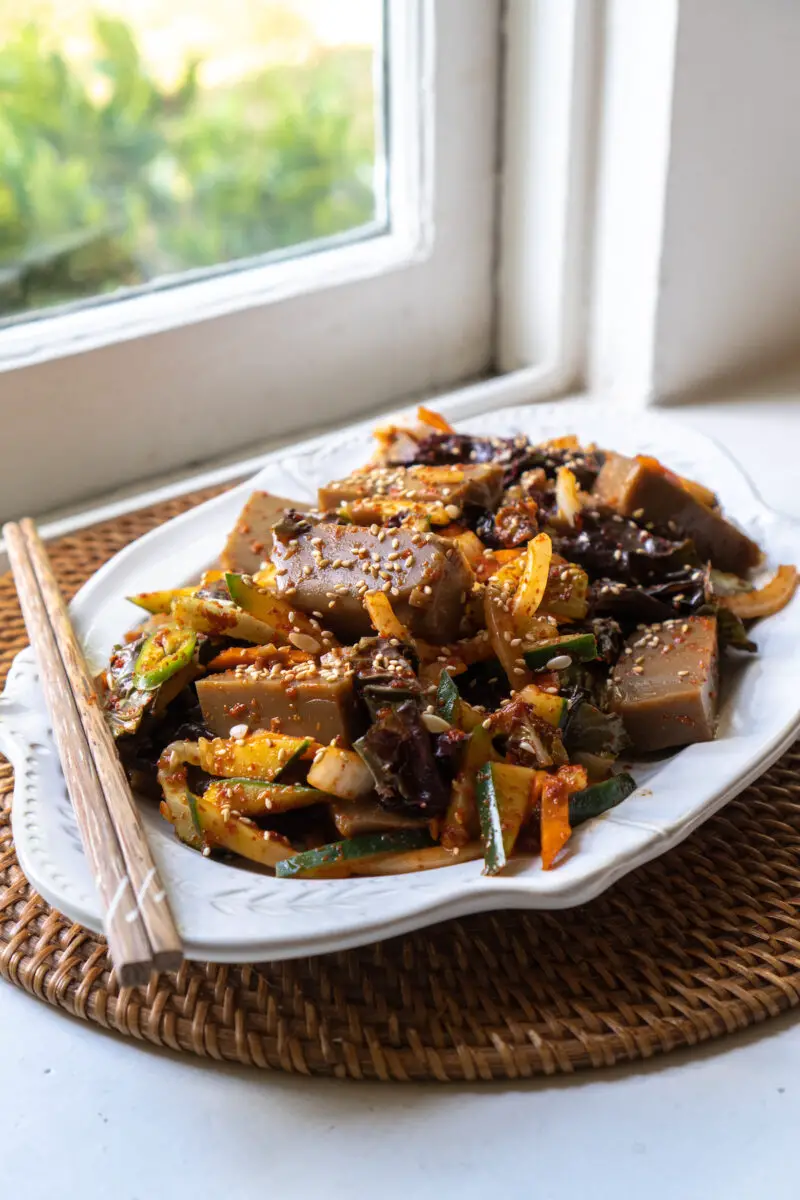
Korean Acorn Jelly Salad Ingredients:
Below, I list the ingredients used to make this delicious Korean dish. I also linked any informative articles connected to the ingredients:
Salad Ingredients:
- Acorn Jelly (learn about how to make Korean acorn jelly)
- Leafy Lettuce
- Yellow Onion
- Cucumber
- Korean Pepper
- Carrot
- Optional: Perilla Leaves (Learn about this ingredient here)
Dressing Ingredients:
- Soy Sauce (Learn about this ingredient here)
- Sugar (or Honey, Corn Syrup, Plum Syrup)
- Minced Garlic
- Vinegar
- Korean Red Pepper Powder (Learn about this ingredient here)
- Toasted Sesame Oil (Learn about this ingredient here)
- Toasted Sesame Seeds (Learn about this ingredient here)
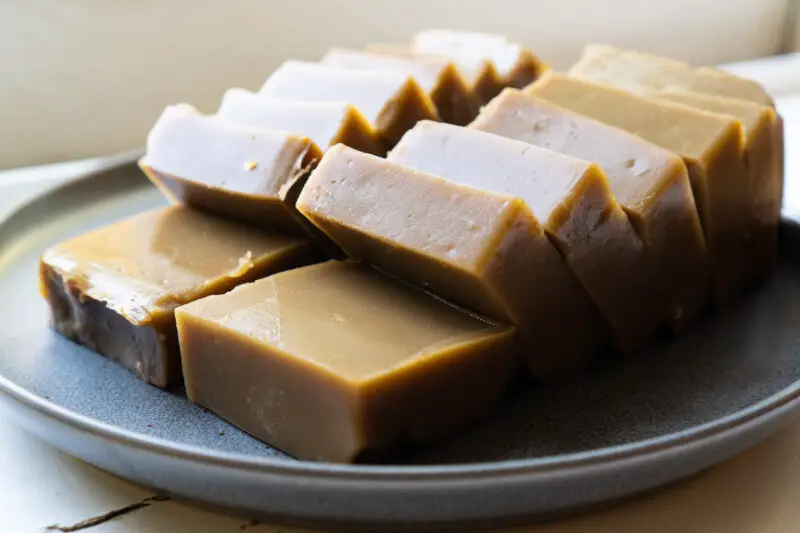
Korean Acorn Jelly (Dotorimuk-Muchim) Tips & Tricks:
Before we get to the recipe, I wanted to give some tips & tricks to help you make this delicious Korean acorn jelly salad! Let me know if these tips help you prepare this dish! If you have any questions, leave a comment below or email me at [email protected].
- If you would like to make Korean acorn jelly from scratch, learn how to do so via our Dotorimuk recipe. If you do not desire to do so, you can buy pre-made acorn jelly at your local Asian grocery store.
- If you make Korean acorn jelly from scratch, make sure to start the process in the morning! The jelly needs to sit for a few hours to harden. While the salad only takes a few minutes to make, you need the jelly to be properly set before mixing it with the rest of the ingredients.
- In my photographs, I do not include perilla leaves. While I often add that ingredient to my dotorimuk-muchim, it can be difficult to find unless you live near a Korean grocery store. If you live near an Asian store, go ahead and add it to this dish. It tastes delicious!
- When dressing the salad, add a little at a time and taste. Some people prefer more or less dressing. Match to your preferences!
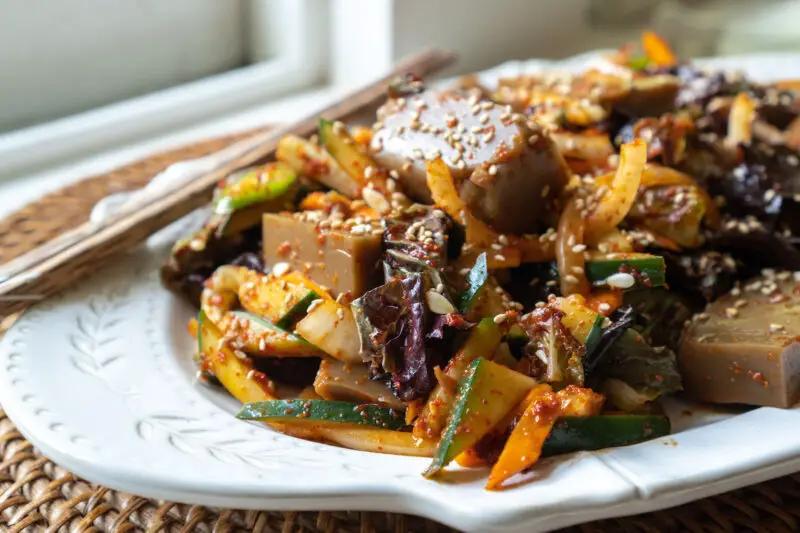
Dotorimuk-Muchim Frequently Asked Questions:
Now that we learned some tips & tricks for making this recipe, I want to answer some questions you may have as well! If I do not answer your question, feel free to leave a comment in the section below or email us at [email protected].
What Does Korean Acorn Jelly Salad Taste Like?
As I previously stated in my dotorimuk recipe, acorn jelly tastes mildly nutty and earthy. The flavor is so subtle you almost wouldn’t know that it is there.
To add more flavor, people often combine different seasonings and ingredients with dotorimuk to make a variety of dishes. One example includes this acorn jelly salad recipe! This salad has a variety of textures from the crispy vegetables and the soft jelly. Then, the dressing adds a punch of umami flavor from the soy sauce, gochugaru, toasted sesame oil, and more!
Does This Recipe Contain Major Allergens? (Gluten, Soy, Etc.)
Excitingly, Korean acorn jelly does not contain most of the major allergens. It does not contain wheat, gluten, soy, peanuts, fish, shellfish, milk, or dairy. I cannot add tree nuts to this list because acorns technically fall into that category. That being said, there is little correlation between allergic reactions to other tree nuts and acorns. Still, if you have a tree nut allergy, I recommend asking your doctor before making this recipe as I am not a medical professional.
While the base of this salad does not contain major allergens, the dressing contains soy sauce. Soy sauce contains both gluten and soy:
- For those like me who avoid gluten because of an intolerance or celiac disease, you can switch out the soy sauce with gluten-free tamari. If you need recommendations, check out my recommendations for gluten-free soy sauce brands!
- For those with a soy allergy, you need to avoid soy sauce altogether. Instead, I recommend using coconut aminos. I also write about my favorite coconut aminos brand in my gluten-free soy sauce alternatives article.
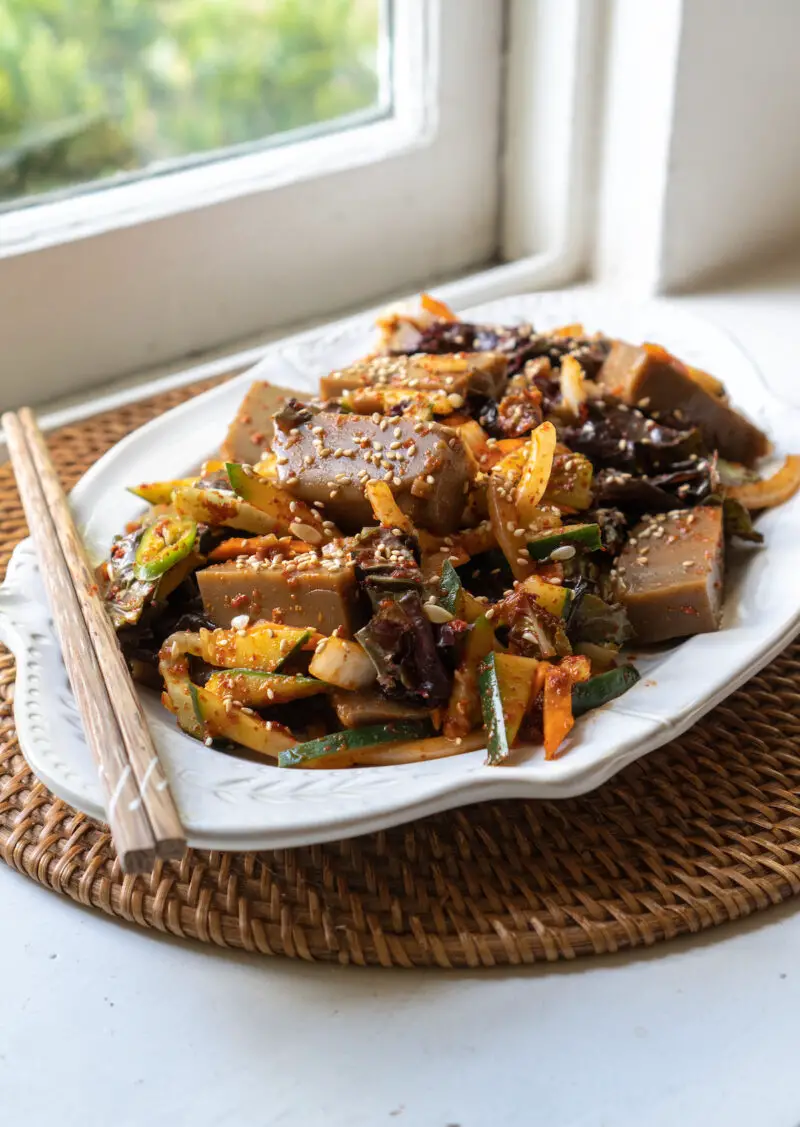
Is This Recipe Vegetarian or Vegan?
Excitingly, this recipe is vegetarian and vegan! For those living these lifestyles, this is safe for you to consume.
While my recipe contains sugar, some people use honey instead. If you are eating out at a restaurant or a friend’s house, always ask about the ingredients.
Where Do You Buy the Ingredients?
You can find almost every ingredient at your local well-stocked grocery store besides the gochugaru and acorn jelly.
I recommend shopping for acorn starch powder to make dotorimuk at an Asian grocery store or online! If you rather buy a pre-made, store-bought version of acorn starch jelly, you can find those at your local Asian grocery as well.
How Should I Store the Leftovers?
To store the leftovers, place the dotorimuk muchim into an airtight container. Then, store the container in the refrigerator. I recommend eating the acorn jelly salad within 1-2 days because the lettuce quickly wilts in the dressing.
Dotorimuk muchim tastes best when made right before serving.
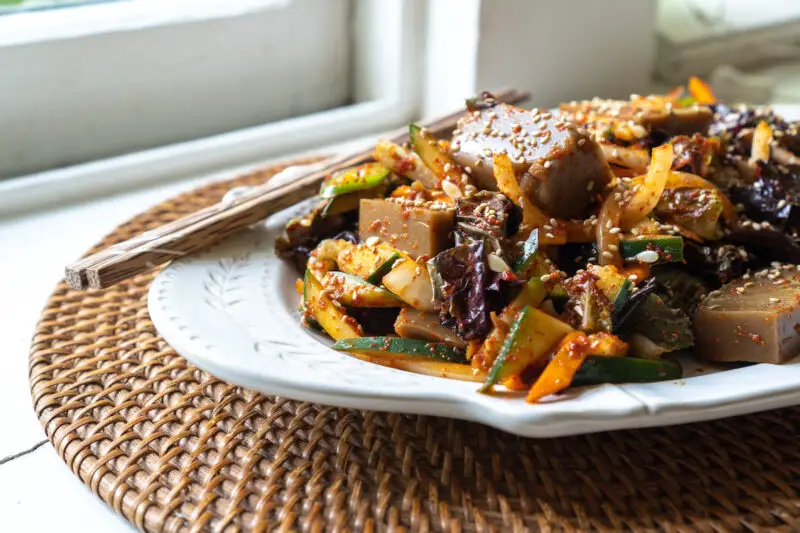
I Hope You Enjoyed Learning How to Make This Korean Acorn Jelly Salad (Dotorimuk Muchim)!
In the end, I hope you enjoyed learning how to make this Korean acorn jelly salad! If so, let me know in the comment section!
If you would like to read more about cooking, you can find further recipes on this blog. I listed some of our favorite Carving A Journey recipes below! For reference, many recipes are influenced by my family’s blended Korean and Southern heritage.
Further Carving A Journey Recipes:
- Korean Plum Tea (Maesil Cha)
- Korean Sausage Stir fry (Sausage Yachae Bokkeum)
- Korean Watercress Salad (Minari Muchim)
If you have any questions or comments, you can also email me at [email protected].
And, finally, I would love to hear from you through our social media as well! You can follow me at @carvingajourney on Instagram, Facebook, and Pinterest. I also started a vlog Youtube channel! Or, if you would like more articles like these, you can subscribe to the blog by joining the mailing list. Let me know if you try making dotorimuk muchim! Thank you so much for stopping by!
Carving A Journey is a participant in the Amazon Services LLC Associates Program, an affiliate advertising program designed to provide a means for sites to earn advertising fees by advertising and linking to Amazon.com. Although we may earn commissions for our endorsement, recommendation, testimonial, and/or link to any products or services from this website, these opinions are my own and I fully support these products.


